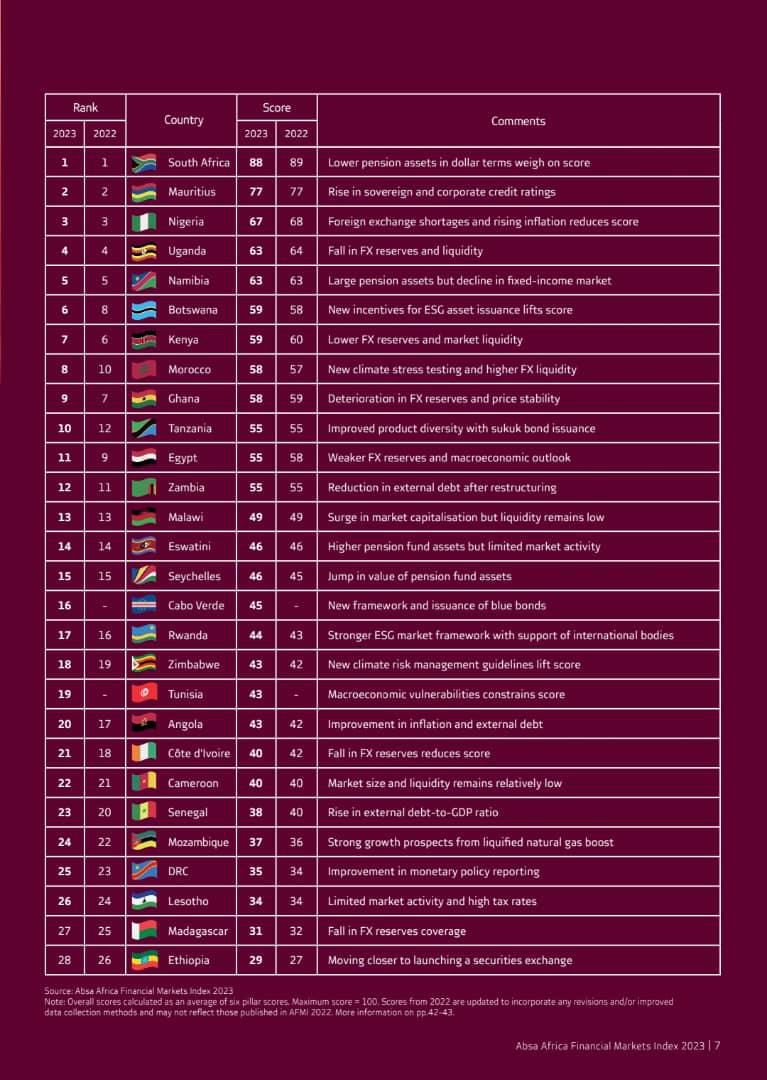Uganda tops region, ranked 4th in Africa in latest financial markets index
)
Trailing only South Africa (1st) Mauritius (2nd) and Nigeria (3rd), Uganda excelled in several aspects of the index, showcasing its robust financial market despite a challenging global economic landscape.
The index, now in its seventh year, is a collaborative effort between the Monitory and Financial Institutions Forum and Absa Group researchers.
It serves as a key tool for businesses, investors, policymakers, and market players, fostering meaningful debates on the security and accessibility of Africa's financial markets.
Uganda's performance, nonetheless was marked by a slight score decline to 62.8 from 64.4 in the previous year.

This decline was attributed to weaker performance in access to foreign exchange, a critical pillar evaluated by the index, highlighting the need for bolstered reserves and liquidity to withstand external shocks.
Kenneth Mumba Kalifungwa, Absa Uganda Managing Director highlighted the importance of the index to economies like Uganda.
“At Absa, we believe that financial markets are vital for financial growth by providing an opportunity to tap into domestic capital but also access to global capital.”
The MD on the other hand, acknowledged the economic resilience displayed by Uganda in 2023, attributing it to sectors such as oil and gas, tourism, and exports.
He added that the nation's ability to navigate the global economic turmoil, including high inflation and the adverse effects of the COVID-19 pandemic and the Russia-Ukraine conflict, speaks volumes about its underlying economic strength and potential for future growth.
Deputy Governor of the Bank of Uganda, Dr. Michael Atingi-Ego, underscored Uganda's commendable achievement of retaining its ranking, emphasizing the enhanced performance bolstered by the adoption of Environmental, Social, and Governance (ESG) policies.
“Our performance in the Index has been enhanced by the Bank of Uganda's adoption of Environmental, Social, and Governance (ESG) policies in our Strategic Plan 2022/27,” he said.
“I am glad to report that the Bank of Uganda has been accepted into the Sustainability Standards Certification Initiative (SSCI) and that several banks have also been accepted into the SSCI. We encourage all financial institutions to join, as it will boost responsible banking practices in the sector.”
The Absa Africa Financial Markets Index evaluates countries based on several pillars, including market depth, access to foreign exchange, market transparency, local investor capacity, macroeconomic opportunity, and the adoption of standard financial agreements.
Uganda's score witnessed a dip due to challenges in the foreign exchange sector, evidenced by a decrease in interbank FX turnover and a significant reduction in international reserves.
However, the nation showed improvement in macroeconomic environment and transparency, retaining its second-place position in this pillar, thanks to policy transparency, high macroeconomic data standards, and a relatively low inflation rate.
A notable area for improvement highlighted in the index is the capacity of local investors, where Uganda scored 14, marking a decrease from the previous year.
Uganda's legal standards and enforceability also received commendation, with the country becoming the seventh AFMI nation to adopt netting legislation. This move, alongside the drafting of a bespoke netting bill, is expected to further improve Uganda's score in future indices.
The index also highlighted Uganda's stable performance in market transparency, tax, and regulatory environment, praising its accounting standards and the development of environmental, social, and governance standards. Additionally, the Ministry of Finance's intention to develop a framework for green bond issuance is a forward-thinking approach that aligns with global financial market trends.
)
)
)
)
)
)
)